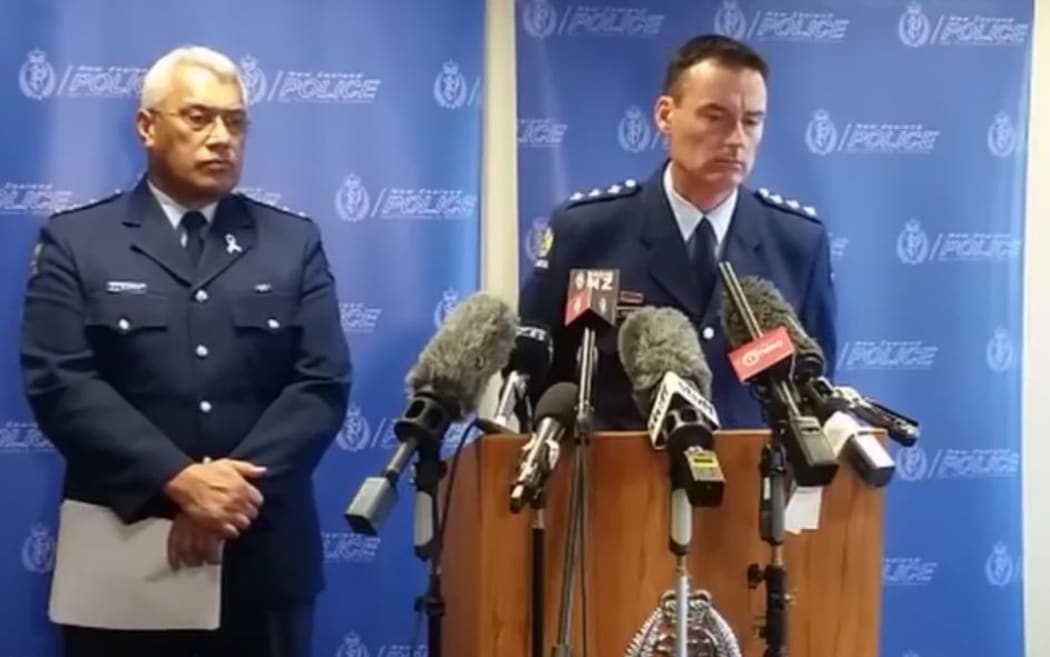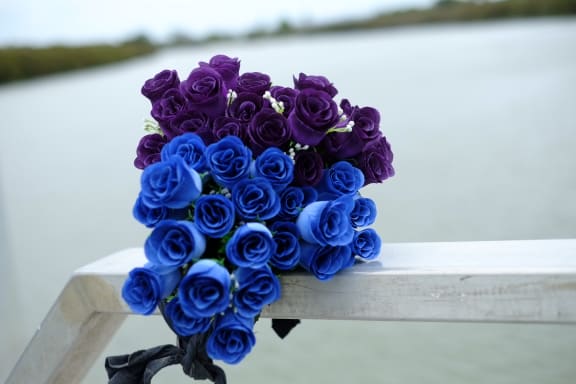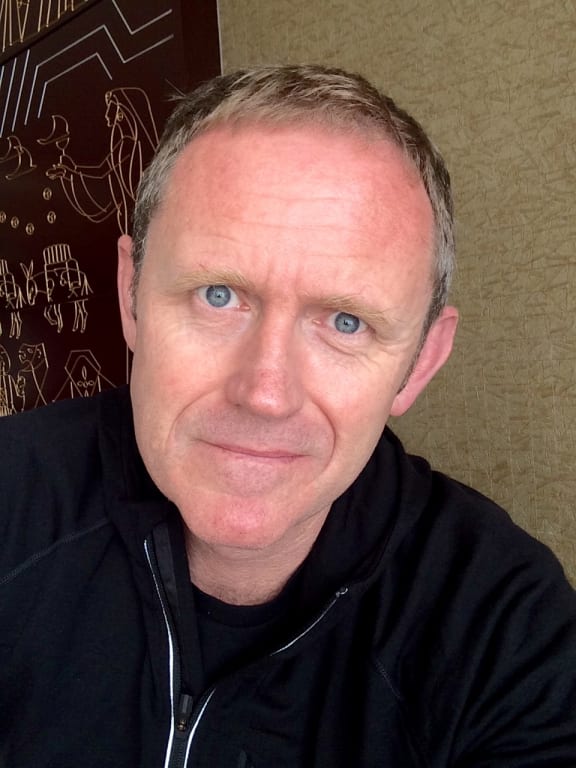The captain of the Francie was blamed for the Kaipara harbour tragedy and heavily criticised in media interviews within 48 hours of the incident. Was that fair?

Inspector Willi Fanene and Inspector Mark Fergus talking to the media. Photo: RNZ
Seven men, including skipper Bill McNatty, died, while another is presumed drowned after the fishing charter vessel capsized in the Kaipara Harbour last Saturday. Three men survived.
Within hours of last weekend's accident, two investigations were under way - one led by the Transport Accident Investigation Commission, and another by police, which could lead to criminal charges.
Coastguard service chief executive Patrick Holmes told TVNZ last Sunday it was important not to speculate about whether the men wore life-jackets, but that was already a major point of discussion in the media.
Speculation about what and who was responsible for the tragedy in the first place was also rife.
On Checkpoint with John Campbell, the skipper of another fishing charter vessel - Tony Walles - pointed the finger of blame squarely at the Francie’s captain:
It was strong stuff.
"People that are talking so far are being too PC," Mr Walles told Checkpoint. "The skipper is wholly and solely responsible. He was the only clown that went across the bar," he said.
John Campbell told Checkpoint listeners Mr Walles had initially been reluctant to speak out, but Mr Walles had also criticised Mr McNatty in a Fairfax Media story. He also criticised the decision to cross the harbour's bar when he spoke to TV3’s Newshub at 6 that night, and on Newstalk ZB that morning, and on TVNZ 1 news the previous day.
Mr Walles had also told the media the motor on the Francie recently "crashed out" on the bar when the captain made a mistake cleaning up oil. He said Mr McNatty had also beached his boat twice trying to cross the bar.

Flowers at Parakai Wharf, from where the Francie set off on Saturday morning. Photo: RNZ / Bradley Ambrose
On Monday Newstalk ZB reported: "Walles conceded he heard about these incidents second-hand and had no evidence they actually occurred.”
Mr Walles wasn't the only one using the media to strongly criticise Mr McNatty's conduct.
But by contrast, Maritime New Zealand didn’t want to comment while investigations were ongoing. Lead Transport Accident Investigation Commission (TAIC) investigator Ian Burfoot didn’t say a lot on Checkpoint for the same reason.
Some Checkpoint listeners didn’t think it was it fair to let Mr Walles condemn Mr McNatty on air in such strong terms.
Feedback read out by Campbell on air included this:
"I'm disgusted you let another captain rant and rave about another dead skipper before the Police or Maritime New Zealand have had the chance to ask questions. Typical of the media."
- Checkpoint listener's feedback
Others sending comments, however, applauded the broadcast of the blunt interview.
All down to the captain?
On Monday a talkback caller named Monty told Newstalk ZB his boat’s skipper refused to go over the Kaipara harbour bar on a charter trip, the day before the Francie capsized.
The man said his party had complained and put pressure on the captain to change his mind.
"We kicked up a stink because we knew the best fish was over the bar. I was thinking anglers on that boat may have given the skipper the same sort of pressure," said Monty.
Later on Newstalk ZB, Kaipara boat captain Tim Somers said once outside the bar, a boat may have to wait as long as two days before coming back in safely - something paying passengers would not be happy about.
While a captain is responsible for the decisions made on the water, these scenarios could have influenced the decision to go out and to come in on the day in question. But neither possibility was discussed in any detail in the media coverage.
Rushing to judgement
Privacy Commissioner John Edwards also posed this question:
I'm looking forward to @MediawatchNZ's take on this story. What r the rules/ethics of such a blistering takedown when the tragedy is so raw https://t.co/oiXf48UVNV
— John Edwards (@JCE_PC) November 28, 2016
The fairness standard in the Broadcasting Code says people portrayed in a broadcast who might be adversely affected should have a fair and reasonable opportunity to comment. Clearly that's not an option when someone has died in a tragedy that they are accused of causing.
The code also says where programmes deal with distressing circumstances - such as grief and bereavement - broadcasters should show "discretion and sensitivity".
But deaths of this nature are clearly newsworthy and there’s nothing to stop the media reporting what witnesses to a tragedy or interested parties say about why and how it might have happened, unless what they say is prejudicial to a prosecution.
Many of the claims made about Mr McNatty’s conduct are also likely to be considered by official investigations. Mr Walles, and others who condemned Mr McNatty in the media, are almost certain to be interviewed.
Out of kilter?
Ad agency owner and broadcaster Vaughn Davis was flying his small plane over the Kaipara region last weekend and encountered the rescue helicopter at his airfield.
"I’ve never seen anything quite like it. There’s just one news narrative and everyone is piling on," he said of last Monday's coverage
If I ever crash my plane I hope I don’t survive to hear the entire country condemning me before the inquiry has even started.
— Vaughn Davis (@vaughndavis) November 27, 2016
But if several people with relevant knowledge are confidently expressing the same opinions, the media can scarcely ignore them.

Vaughn Davis, owner and creative director of ad agency The Goat Farm Photo: supplied
"Coverage of something like that must start quickly and in depth the moment it becomes news, but (the coverage) across a lot of platforms seemed to be assuming the captain was guilty, and finding voices that would do the same," he told Mediawatch.
"In the court of public opinion, we've all decided what happened. Should the truth come out at variance with what's been reported so far, I'd be surprised of it gets 10 per cent of the airtime the condemnation narrative did," said Mr Davis
Back in 2012, eight men also died - including the captain - when the Easy Rider charter boat capsized.
Only one man survived that incident and the TAIC inquiry found the captain’s actions, decisions and lack of training contributed to the tragedy. There was nothing like the condemnation of the late Mr McNatty in recent days aired by several media outlets.
Mr Davis said it was significant that the Kaipara tragedy happened within a moderate drive and a short helicopter ride of the major media newsrooms in Auckland.
"I have a background in civil and military aviation. Crash investigations show there's never just one cause, one decision by one person. there's a chain of events," he said.
"We're not going to know exactly what happened for months - and I'm happy to wait," he said.
But when a disaster hits the headlines these days, the news media are not.

